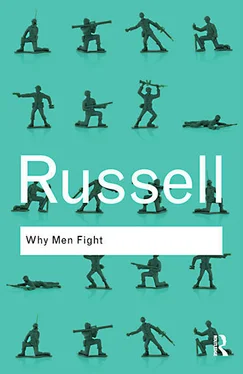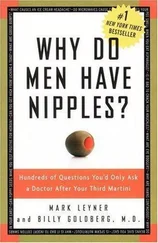All our institutions have their historic basis in Authority. The unquestioned authority of the Oriental despot found its religious expression in the omnipotent Creator, whose glory was the sole end of man, and against whom man had no rights. This authority descended to the Emperor and the Pope, to the kings of the Middle Ages, to the nobles in the feudal hierarchy, and even to every husband and father in his dealings with his wife and children. The Church was the direct embodiment of the Divine authority, the State and the law were constituted by the authority of the King, private property in land grew out of the authority of conquering barons, and the family was governed by the authority of the pater-familias.
The institutions of the Middle Ages permitted only a fortunate few to develop freely: the vast majority of mankind existed to minister to the few. But so long as authority was genuinely respected and acknowledged even by its least fortunate subjects, mediæval society remained organic and not fundamentally hostile to life, since outward submission was compatible with inward freedom because it was voluntary. The institutions of Western Christendom embodied a theory which was really believed, as no theory by which our present institutions can be defended is now believed.
The mediæval theory of life broke down through its failure to satisfy men’s demands for justice and liberty. Under the stress of oppression, when rulers exceeded their theoretical powers, the victims were forced to realize that they themselves also had rights, and need not live merely to increase the glory of the few. Gradually it came to be seen that if men have power, they are likely to abuse it, and that authority in practice means tyranny. Because the claim to justice was resisted by the holders of power, men became more and more separate units, each fighting for his own rights, not a genuine community bound together by an organic common purpose. This absence of a common purpose has become a source of unhappiness. One of the reasons which led many men to welcome the outbreak of the present war was that it made each nation again a whole community with a single purpose. It did this by destroying, for the present, the beginnings of a single purpose in the civilized world as a whole; but these beginnings were as yet so feeble that few were much affected by their destruction. Men rejoiced in the new sense of unity with their compatriots more than they minded the increased separation from their enemies.
The hardening and separation of the individual in the course of the fight for freedom has been inevitable, and is not likely ever to be wholly undone. What is necessary, if an organic society is to grow up, is that our institutions should be so fundamentally changed as to embody that new respect for the individual and his rights which modern feeling demands. The mediæval Empire and Church swept away the individual. There were heretics, but they were massacred relentlessly, without any of the qualms aroused by later persecutions. And they, like their persecutors, were persuaded that there ought to be one universal Church: they differed only as to what its creed should be. Among a few men of art and letters, the Renaissance undermined the mediæval theory, without, however, replacing it by anything but scepticism and confusion. The first serious breach in this mediæval theory was caused by Luther’s assertion of the right of private judgment and the fallibility of General Councils. Out of this assertion grew inevitably, with time, the belief that a man’s religion could not be determined for him by authority, but must be left to the free choice of each individual. It was in matters of religion that the battle for liberty began, and it is in matters of religion that it has come nearest to a complete victory. [8] 2 This was written before Christianity had become punishable by ten years’ penal servitude under the Military Service Act (No. 2). [Note added in 1916.]
The development through extreme individualism to strife, and thence, one hopes, to a new redintegration, is to be seen in almost every department of life. Claims are advanced in the name of justice, and resisted in the name of tradition and prescriptive right. Each side honestly believes that it deserves to triumph, because two theories of society exist side by side in our thought, and men choose, unconsciously, the theory which fits their case. Because the battle is long and arduous all general theory is gradually forgotten; in the end, nothing remains but self-assertion, and when the oppressed win freedom they are as oppressive as their former masters.
This is seen most crudely in the case of what is called nationalism. Nationalism, in theory, is the doctrine that men, by their sympathies and traditions, form natural groups, called “nations,” each of which ought to be united under one central Government. In the main this doctrine may be conceded. But in practice the doctrine takes a more personal form. “I belong,” the oppressed nationalist argues, “by sympathy and tradition to nation A, but I am subject to a government which is in the hands of nation B. This is an injustice, not only because of the general principle of nationalism, but because nation A is generous, progressive, and civilized while nation B is oppressive, retrograde, and barbarous. Because this is so, nation A deserves to prosper, while nation B deserves to be abashed.” The inhabitants of nation B are naturally deaf to the claims of abstract justice, when they are accompanied by personal hostility and contempt. Presently, however, in the course of war, nation A acquires its freedom. The energy and pride which have achieved freedom generate a momentum which leads on, almost infallibly, to the attempt at foreign conquest, or to the refusal of liberty to some smaller nation. “What? You say that nation C, which forms part of our State, has the same rights against us as we had against nation A? But that is absurd. Nation C is swinish and turbulent, incapable of good government, needing a strong hand if it is not to be a menace and a disturbance to all its neighbours.” So the English used to speak of the Irish, so the Germans and Russians speak of the Poles, so the Galician Poles speak of the Ruthenes, so the Austrians used to speak of the Magyars, so the Magyars speak of the South Slav sympathizers with Serbia, so the Serbs speak of the Macedonian Bulgars. In this way nationalism, unobjectionable in theory, leads by a natural movement to oppression and wars of conquest. No sooner was France free from the English, in the fifteenth century, than it embarked upon the conquest of Italy; no sooner was Spain freed from the Moors than it entered into more than a century of conflict with France for the supremacy in Europe. The case of Germany is very interesting in this respect. At the beginning of the eighteenth century German culture was French: French was the language of the Courts, the language in which Leibniz wrote his philosophy, the universal language of polite letters and learning. National consciousness hardly existed. Then a series of great men created a self-respect in Germany by their achievements in poetry, music, philosophy, and science. But politically German nationalism was only created by Napoleon’s oppression and the uprising of 1813. After centuries during which every disturbance of the peace of Europe began with a French or Swedish or Russian invasion of Germany, the Germans discovered that by sufficient effort and union they could keep foreign armies off their territory. But the effort required had been too great to cease when its purely defensive purpose had been achieved by the defeat of Napoleon. Now, a hundred years later, they are still engaged in the same movement, which has become one of aggression and conquest. Whether we are now seeing the end of the movement it is not yet possible to guess.
Читать дальше












